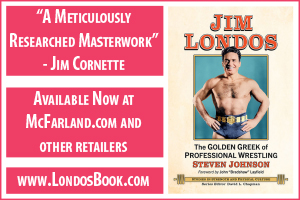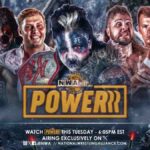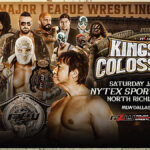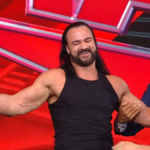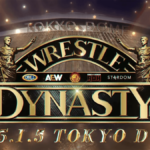In a better world, any interested wrestling fan would be able to sit down with Jim Ross for an hour-long, one-on-one conversation. Ross is smart, eloquent, and more than able to carry a conversation. These skills are a big part of what’s made him as successful as he’s been in his career as a sports announcer. Ross can take even the most ham-fisted question, like the one I opened our interview with, and spin a seven-minute answer that will make you think of four better questions to ask him next.
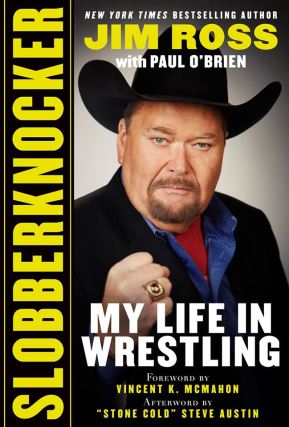
And aside from his deep, often first-hand knowledge of wrestling from the 1950s on, Ross is self-aware and can use his sawdust-dry sense of humour to be quite funny. Ross, above all, is a storyteller, one of the best that the wrestling business has produced.
His skills are put to excellent use in his autobiography, Slobberknocker, released in October by Sports Publishing. The book is a reflection on how a bookish boy from rural Oklahoma made a career in the often loud and crass world of pro wrestling. The book, like Ross, is funny and honest. It reveals layers of personality beyond the broad caricature of his public persona, defined by the simple black cowboy hat that Ross typically wears and that fans have come to identify him with.
“I put a hat on at the encouragement of ‘the chairman’ [World Wrestling Entertainment owner Vince McMahon]. Being the typical defiant and ego-centric performer that I have been, I didn’t like the idea. It was stage dress. You can come to Oklahoma anytime you want and you’ll see more people not wearing a hat than do, but the stereotype is that we Okies, we southerners, cowboys and Indians, all that good stuff…we have a hat on.” When McMahon first encouraged Ross to adopt the hat, he explained to him that, “JR, we’re stereotypes.” In conversation, though, Ross is far from one.
Ross is also a bundle of contradictions and it can be fun to try and unwind them. Quiet and thoughtful as a child (he named the feed animals on his family’s farm), he grew up with a demanding father who consistently taught him that life is cruel and unfair and that to be slow was to risk being eaten. “He meant it as a way to gird his only son against a post-Vietnam America that he saw,” as Ross writes, as being “full of dissent and danger.” As an adult, Ross thrived in a setting where his most famous employer, Vince McMahon, practiced these principles with exacting skill.
In conversation, Ross can still be openly sensitive and almost vulnerable. Even giving interviews, which Ross has been doing almost non-stop as part of the book’s promotion, must be an emotional high-wire act. Ross’s wife of almost 24 years, Jan Ross, was killed unexpectedly in March 2017 in a motor vehicle accident. “It still kills me,” he says, and the pain and confusion in his voice is unmissable.
The writing of Slobberknocker was marked by emotional challenges throughout. Ross started the book in 2013 after leaving his job with the WWE. At 61, he was forced to choose, as he says, whether “to reinvent” or to retire. “In the 45-minute drive or so, from Stamford, Connecticut, and the WWE Corporate Offices to Laguardia Airport in New York City, I decided that I was going to reinvent. That I wasn’t ready to hang it all up,” he says. “It’s a classic example where you have a bad day and you end your 20-plus year relationship with your company and an hour later you’re thinking of ways to get back into the game.”Ross began writing with Scott Williams, the co-author of autobiographies with Terry Funk (More Than Just Hardcore) and Ross’s mentor, Bill Watts (The Cowboy and the Cross). Williams died unexpectedly in 2016 and Ross turned to Paul O’Brien to continue work. After Ross’s wife’s death, he again thought about abandoning the project.
“When Jim first asked me come on board, I felt I could empathize with his story,” writes O’Brien via email from Ireland. “Even though Jim and I live thousands of miles apart, and we’re separated by age, he came from a rural background, where his quiet, hard father worked two jobs and Jim had to use his imagination to keep himself entertained. I had the same kind of upbringing. Then when Jan died, I thought that Jim had every right to close the project down. But he wanted to honour her memory. He wanted to keep the ship afloat and to get the story that she was so intimately involved, out into the world.”
Ross now calls the book “battle tested,” but it came very close to being abandoned. “I didn’t feel like I could squeeze enough emotion out of myself to finish it off,” he says. “I thought about that and it’s just not the way I’ve ever done my business. I like to think I’m not a quitter. My dad taught that it gets really easy to quit if you start doing it.”
A fan of pro wrestling since first discovering it on television in the 1950s, Ross has retained his enthusiasm for it while watching it change from a local blood and guts sideshow to a mass-produced, micro-managed, spectacle with layer upon layer of nuance. It’s been his passion and his business for his entire adult life. “Wrestling fans have been the equivalent of fat-shamed for years,” he says. “Forever. They’ve always been ridiculed. ‘You watch that stuff? C’mon.’ I’ve heard it all. It’s amazing how some people, their ego, their own insecurities, just blossom when you talk about wrestling.”It’s this love that has served him so well in his announcing career. Talking with USA Today about his now famous call of the 1998 Undertaker versus Mick Foley Hell in a Cell match, Ross told them, “Everything you heard was real.” The quote neatly sums up Ross’s ongoing appeal as an announcer. When he first started getting attention as a wrestling announcer in the mid-’80s, Ross, with his self-described “chubby face and a Oklahoma-southern accent,” used his dedicated seriousness as an anecdote to the post-modern self-awareness that was seeping into wresting. Ross patterned his style on Gordon Solie, who is acknowledged by many as wrestling’s finest play-by-play announcer. “The thing with Gordon was simple,” he says. “He sounded unique. He sounded educated. He used a vernacular that ‘heretofore’ many of us never had heard in conjunction with a pro wrestling show. He stood out.”
To be as successful as Ross has been for as long as he’s been, and in so many different settings, he’s needed to believe in wrestling more than anyone. A wink, or the slightest hint of condescension, would have broken the bond with fans that Ross spent his career building. “To do well, I needed to be able to feel and process the music that I was hearing from the wrestlers,” he says. “Their music meaning their wrestling, their bell to bell movements. I needed to put a lyric to that music. Their action needed a narrative and that’s what Gordon [Solie] did and that’s what I always try to do.”
Slobberknocker is a breezy run through the first half of Ross’s wrestling career, from the very first show he promoted in 1973 to the 1999 WrestleMania match between The Rock and Steve Austin that served as his comeback. It has a heavy and welcome focus on his career in the territory system, where Ross worked for promoters Leroy McGuirk, Bill Watts, and finally, Jim Crockett. Ross leaves plenty of room for a sequel and he’s already spoken publicly of plans for a second book. “The book was structured to be able to do a sequel,” he says, “but the main thing is I didn’t want to skim over stuff I believed to be important. I didn’t want to throw those things away or not cover it all because I’m trying to do everything in one book. It just didn’t seem viable. And selfishly, I enjoy writing.”Ross also openly writes about his struggles with prescription drugs and his failures both in business and his personal life. A first marriage goes almost unmentioned in the book, and he admits to being less than successful as a father. “I was so driven, in an unhealthy way, that I prioritized my jobs, my vocation, ahead of everything else,” he says. “And that’s not healthy and it’s wrong. I had a lot of health issues that I kept masking and suppressing and things. I didn’t take care of me. I wasn’t doing a very good job of being around. I didn’t take care of myself very well. My job was the biggest thing. Broadcasting was my be all, end all.”
At times, Slobberknocker recalls Ric Flair’s autobiography To Be The Man (co-written with Keith Elliot Greenberg) in the way it so openly speaks to struggles like panic attacks, depression, and anxiety, conditions that often go undiscussed among men. It’s well known that Ross has suffered from multiple bouts of Bell’s Palsy, which have effected both his speech and his appearance. The condition was a particularly cruel blow for someone whose livelihood is based on appearing on TV as well as one taught to crave “toughness and steel,” as Ross writes, over all things. “I was in a deep depression,” he says, discussing the time following his initial attack. “[I was] self-diagnosing, not wanting to face the facts, and sure as hell not wanting to admit to anyone that I had a flaw, that I had a weakness. I’d already shown that I had a weakness with my face. I’ll be damned if I’m going to add to that.”
In one of the book’s most striking passages, Ross recalls the panic he felt before making his return as an announcer at WrestleMania XV; “It took me an hour just to put my tux on, because I kept stopping and thinking, ‘Maybe I should go tell Vince I can’t do this now…’ I cried, I lost focus, I got sick. I didn’t want to be court-martialed. I just wanted my honorable discharge.”
Ross’s wife helped him through the panic, and it’s impossible to read the book and miss the importance of that relationship to Ross’s life. “This book has a little bit of a love story embedded in it with my wife and I, and that didn’t strike me that way until I sat down to read [the audio book]. I’d start crying and have to stop and get my composure. It was very real to me because it was true and I lived it. And when I was talking about her, she’s no longer here. She’ll never be here. For my lovely wife, who was with me for 24 years of marriage almost, people are going to be able to read that a relationship between significant others can be so amazing. Whoever loves you the most in the world, you can have such a wonderful relationship with if you have a friendship with them as well. And I did with her.”The book, too, is about persevering in spite of failure as much as it is about success. “After [WrestleMania XV] was over, I had a lot of confidence back,” he says.”‘You can do this. Don’t give your jersey up.’ So that’s been my theory ever since, ‘I don’t want to give my jersey up. I want to stay in the game.'”
It’s a mantra that Ross continues to try and live up to. He continues to work with New Japan Wrestling and WWE, as well as produce his weekly podcast, The Ross Report. His decision to reinvent instead of being forced into retirement has kept him busy. “When you’re reading this book, ‘Why not me?’ should be the first thing you say. … [Jim Ross] did it. There’s no reason I can’t. I’m average guy.’ I’m telling you. I’m a wrestling fan. And I got really fortunate and I just didn’t have enough common sense or enough street smarts to know how much the odds were against me.”
RELATED LINKS

